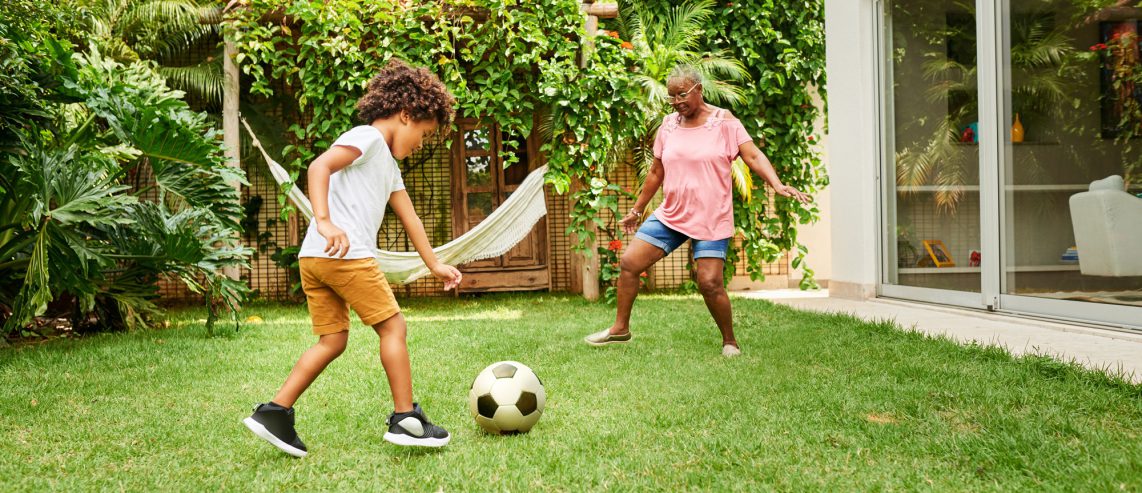Are you part of a family of weekend warriors and sports fanatics? Chances are high you’ll have to treat some common sports injuries, like muscle strain and joint pain. You’ll also need to deal with the insect bites, allergens, and other nuisances that come with the joy of physical activity and the great outdoors.
Here are the key items UPMC Sports Medicine experts recommend you stock in your medicine cabinet or bag so you’re ready to tackle problems your active crew may face.
Instant Ice Pack
An instant ice pack contains water and a chemical reactor. When you squeeze the pack, the barrier between the water and reactor breaks. The chemical reactor causes the water to freeze.
Instant ice packs can treat swelling and pain from a sports injury, as well as from a bee sting.
Steroid Nasal Spray
If you or someone in your family is allergic to pollen, you can still enjoy a family hike. Steroid nasal spray reduces inflammation, which reduces coughing and sneezing. Many are available over the counter, while others require a prescription.
Steroid nasal sprays treat allergic reactions, but they can also prevent them in the first place. If it’s pollen season, prevent allergy symptoms by starting the spray about a week before a hike.
Check with your doctor before using a steroid nasal spray.
Never Miss a Beat!
Subscribe to Our HealthBeat Newsletter!
Thank you for subscribing!
You can now select the specific newsletters you'd like to receive.
You are already subscribed.
Subscribe to more newsletters in our email preference center.
Sorry, an error occurred. Please try again later.
Get Healthy Tips Sent to Your Phone!
Saline Solution or Antiseptic Wipes
You can clean wounds with mild soap and water, but you might not always have access to it. That’s why it’s a good idea to include a saline solution or antiseptic wipes in your to-go sports medicine pack. Once you clean the wound, apply a bandage or dressing to keep out dirt.
Bandages, Gauze, and Small Scissors
All active sports families should have supplies to keep a wound clean and add pressure to a wound. You should have a variety of sizes of adhesive bandage for smaller cuts, as well as gauze pads and wrap for larger wounds. If you pack a self-adhering wrap, you won’t need to worry about tape or fasteners, but you’ll still need scissors.
Diclofenac Topical
This is a good medicine to stock up on to help treat common sports injuries, like a sprained ankle, bruise, or strained muscle. It’s a topical over-the-counter pain reliever available as a lotion, gel, patch, and spray. Unlike oral pain relievers, it doesn’t pose a risk of digestive upset or liver problems.
Tweezers
Whether you’re pulling out a splinter or removing a tick, tweezers have many uses for an active sports family.
Antifungal Spray or Lotion
People who play sports and hike are more prone to fungal infections because they sweat more and often wear tight-fitting gear.
Antifungal spray or cream can treat both jock itch and athlete’s foot. Jock itch is a fungal infection commonly found in the groin area. Athlete’s foot often starts between the toes and is more likely in people who sweat in tight-fitting shoes and socks.
Many antifungal treatments are available over the counter at your local pharmacy. Follow the instructions on the package, as the infection can worsen if you stop the treatment too early.
Sport Sunscreen
To avoid burns and help prevent skin cancer, look for a water and sweat-resistant sunscreen with an SPF of at least 30. Most sunscreens labelled “sport” should fit the bill. Unlike regular sunscreens, these sunscreens are less likely to bead up and sting the eyes when mixed with sweat.
Sprays are great for fast, easy application. The American Association of Dermatology warns, however, that many people don’t evenly apply sprays. Make sure you adequately spray the skin and rub it afterward.
1% Hydrocortisone Cream
This is a good medicine to stock up on, because when a kiddo has an itchy bite, they want relief fast. Hydrocortisone at 1% concentration can relive itchiness from a mosquito or other bite and is safe in children over two years. It can also treat itchy rashes and eczema.
Sources
American Red Cross. Make a First Aid Kit. Link
American Academy of Dermatology Association. How to treat minor cuts. Link
American Academy of Dermatology Association. Sunscreen Facts. Link
Jennifer King Lindley. How to stock your medicine cabinet based on your specific needs, according to MDs. Link
Emily Reed. How to build a proper first aid kit. Outside. Link
About Sports Medicine
An athletic lifestyle carries the potential for injury. Whether you’re an elite athlete or a weekend warrior, UPMC Sports Medicine can help. If you are looking to prevent, treat, or rehabilitate a sports injury, our multidisciplinary team of experts can help you get back into the game. If you are seeking to improve your athletic performance, we can work with you to meet your goals. We serve athletes and active people of all ages and experience levels. Our goal is to help you keep doing what you love. Visit our website to find a specialist near you.
